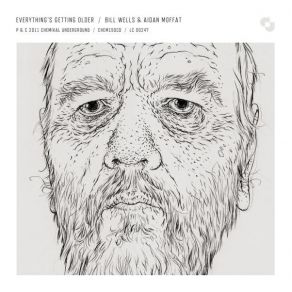Everything's Getting Older
Download links and information about Everything's Getting Older by Aidan Moffat, Bill Wells. This album was released in 2011 and it belongs to Rock, Indie Rock, Alternative genres. It contains 12 tracks with total duration of 39:17 minutes.

|
|
|---|---|
| Artist: | Aidan Moffat, Bill Wells |
| Release date: | 2011 |
| Genre: | Rock, Indie Rock, Alternative |
| Tracks: | 12 |
| Duration: | 39:17 |
| Buy it NOW at: | |
| Buy on iTunes $9.99 | |
Tracks
[Edit]| No. | Title | Length |
|---|---|---|
| 1. | Tasogare | 1:58 |
| 2. | Let's Stop Here | 4:19 |
| 3. | Cages | 2:25 |
| 4. | A Short Song to the Moon | 1:03 |
| 5. | Ballad of the Bastard | 2:42 |
| 6. | The Copper Top | 5:22 |
| 7. | Glasgow Jubilee | 3:57 |
| 8. | (If You) Keep Me In Your Heart | 3:24 |
| 9. | Dinner Time | 4:07 |
| 10. | The Sadness In Your Life Will Slowly Fade | 3:17 |
| 11. | The Greatest Story Ever Told | 4:19 |
| 12. | And So We Must Rest | 2:24 |
Details
[Edit]Somehow an Aidan Moffat album starting out with a piano part courtesy of collaborator and longtime Glasgow music fixture Bill Wells that could almost be Lionel Richie and Diana Ross' "Endless Love" seems weirdly appropriate. It doesn't quite stay like that, but Wells' shift to include brushed drums and acoustic bass atmospheres doesn't change the fundamental sense of the duo finding a split between elegant melancholy in and of itself and, courtesy of Moffat's lyrics, often vivisecting what the ideas of it could be. It's something Moffat's long been interested in, so to have the first song with vocals, "Let's Stop Here," tackle ideas of teenage fantasy, adult possibility, and rejecting a one-off experience while still struggling with the idea of it, is only apt. Throughout, Wells' arrangements are excellently matched with Moffat's lyrics and performances song for song — his rhythmic, softly altering piano part on "The Copper Top" is stellar, a steady backing for Moffat's short story in miniature, and just one element of a lovely piece that builds up to a conclusion led by muted trumpet. That it's immediately followed by the rhythm-heavy click and punch of "Glasgow Jubilee" — a chance for Moffat and Wells to do their own turn on breaks and MC'ing — seems right, especially given the tale of a slew of boozing, shagging, and more. Thus this exchange between a pickup of the narrator's and the narrator himself: "Your lyrics are the ramblings of a lonely solipsist"/I said, "I'm playing Sunday night, shall I put you on the list?" "Ballad of the Bastard" couldn't be more of an on-point song title from Moffat either, while his capturing of a combination of self-pity and exculpatory explanations manages the neat trick of being both attractively compelling and utterly loathsome. Moffat's occasional spoken word delivery is in full effect as ever, splitting the difference nicely on "Cages," taking the full story-telling stance on "Dinner Time" against a backing that couldn't be more jazzily film noir — unsurprisingly appropriate given the story of a somewhat unsettled visit home. There are moments of light breaking through here and there, as in the minute-long jaunty rollick of "A Short Song to the Moon" — a song of praise and thanks for said heavenly object for putting up with the narrator in all his moods — that ends with "Who needs the troubles of love/When you're still glowing above?" The troubles may not be needed, but Moffat and Wells both deserve credit for finding ways to capture them just so.